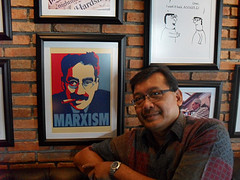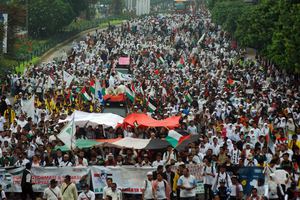ON 2 March 1993, around 300 Muslim students, calling themselves the “Komite Mahasiswa Muslim Anti Zionis Yahudi” (KMMAZY – Muslim Students’ Committee against Jewish Zionists) held a demonstration in front of the ICMI office at Kebon Sirih, Central Jakarta. They criticized the visit by four Indonesian journalists to Israel in February 1993, on the invitation of the Israeli prime minister, Yitzhak Rabin.
The four journalists were Derek Manangka of Media Indonesia, Wahyu Indrasto of Eksekutif, Taufik Darusman of the Indonesian Business Weekly and Nasir Tamara of Republika. They left Jakarta on 8 February for Cairo, from where they arrived in Tel Aviv on 9 February. During their ten-day stay in Israel, they visited several important places and interviewed Yitzhak Rabin. In their statement, the students pro-tested against the visit of the journalists to Israel and especially to the participation of Nasir Tamara, whose newspaper is closely related to the ICMI and who occupies a prominent position in this Muslim organization. Moreover, they asked the government to oppose the peace agreement between Palestine and Israel and to be on the alert for Zionist agents in the country. Republika is published by PT Abdi Massa, which in part of the Abdi Massa Foundation, created by the ICMI. (See INIS Newsletter Vol. IX, p. 54).A similar demonstration was held in front of the office of the Persatuan Wartawan
Indonesia (PWI – Indonesian Association of Journalists) by about 100 youths, associated in the “Pemuda Penyelamat Wibawa Indonesia” (Youth for the Salvation of the Authority of Indonesia). Their representatives were received by Sofyan Lubis, the chairman of the association, and Parni Hadi, its secretary, who is also the Editor-in-Chief of Republika.
Actually, since the 1980s many Indonesians have been visiting the country, although no diplomatic ties exist between the two countries. After the signing of the Israeli-Palestinian peace agreement of 13 September 1993, many Indonesian voices had warned the Indonesian government not to open diplomatic relations with Israel in too much of a hurry and the government had agreed to adopt an attitude of circumspection (see INIS Newsletter, Vol. X, p. 32-34). On the other hand, however, in October 1993, the Israeli Prime Minister Yitzhak Rabin paid a visit to Indonesia which had been kept secret up to the last moment. He met President Soeharto in his role as Chairman of the (NAM). The main topic of their discussion had been the recent Israeli-Palestinian peace treatment. (JP, 18 Feb.; DE, 1 March 1994)
Several other Muslim figures and organizations also condemned the visit of the four journalists. On 20 February 1994, the Central Executive Board of the Pemuda Muhammadiyah (Muhammadiyah Youth) issued a statement saying that the trip was a fruit of intensive Zionist lobbying and represented a political victory for Israel. It warned that the four journalists would be in danger of loosing their objectivity in judging Israel’s brutality against the Palestinian people. It called on Indonesian journalists or any other citizens not to visit Israel, reminding people that the preamble of the Indonesian constitution rejected any kind of colonization, and that Israel still colonized Palestine. (PE, 21 Feb. 1994)
Other protests came from Aisyah Amini, a member of the DPR for the PPP, and K.H. Hasan Basri, the Chairman of the MUI. Meanwhile, Ichwan Sam, the secretary-general of NU, and K.H. Muchtar Natsir, imam of the Istiqlal Mosque of Jakarta, underlined the fact that the journey of the four journalists should be judged according to its intention and result: would they write articles in defence of Israel or, conversely, would they contribute to a better covering of the Palestinian cause in Indonesia. (PE, 22, 26 Feb., 7 March 1994)
On 3 March, three of the four journalists, namely Darusman, Manangka, and Indrasto, met Minister Ali Alatas at his office to explain the reasons of their trip, while Nasir Tamara extended his journey in the Middle East precisely to be able to complete his report with information collected from leading Palestinian figures. The three journalist in Jakarta explained that it was the Israeli government which had invited them and had acted as their host in Israel, but that they themselves – or their newspapers – had provided the travelling expenses to and from Israel. Alatas, himself, declared that the visit was premature and could be used by Israel in its own interests. Furthermore, it also could create a grave misperception about Indonesia’s foreign policy. He understood the journalistic merit of the mission but added that such a visit would undoubtedly carry political implications. He also reminded the journalists that as a prominent country with a large Muslim majority, Indonesia’s political stand in the international arena often influenced the decision of other Muslim states. (JP, KO, PE, 4 March 1994)
The next day, 4 March, Prof. Dr. B.J. Habibie, the Chairman of the ICMI and Minis¬ter of Technology, said that he had approved the journey of the Republika journalist, Nasir Tamara, to Israel, after this journalist had announced his plan to him. In principle, he explained, in order to find the truth, a journal¬ist should travel to all the corners of the world, including venturing on to hostile soil. (JP, PE, 5 March 1994) On the same day, after performing the Friday prayer, Ridwan Saidi staged a demonstration with 5000 other Muslims in the courtyard of the Al Azhar Mosque, South Jakarta, to protest about the trip of the four journalists and to condemn the massacre of 25 February in the mosque of Hebron. Saidi again concentrated his criticism on Nasir Tamara, as a Muslim intellectual. The journalists apparently had succumbed to the strategy of the Mossad, he added. In conjunction with all these criticisms, the editor-in-chief of Republika, Parni Hadi, said that he understood the protests and even considered them to lend moral support to his newspaper.However, he trusted Nasir Tamara as a senior journalist and emphasized that Republika directed its reportage supporting the struggle of the Palestinian people. (DE, 9 March 1994)
In the meantime, Drs. Lukman Harun, the chairman of the Committee for Assistance for the Liberation of Palestine and the al-Aqsa Mosque, met Habibie at his residence on 6 March. During the meeting, he expressed his disappointment about Habibie’s approval of the mission of the Republika journalist to Israel. Habibie reconfirmed that he understood the feelings of those who protested and emphasized that he fully supported the Palestinian struggle to liberate their land from Israel and to create an independent state. (PE, 7 March; RE, 8 March 1994) Earlier, Ahmad Sumargono of the KISDI, met Ali Alatas in his office to ask about the news published on 15 February 1994 in Media Indonesia, citing certain remarks of the Israeli Prime Minister. According to this article, at his meeting of October 1993 with President Soeharto Yitzhak Rabin, had declared that although the two countries had no diplomatic relations, business and economic activities could none the less be conducted, going on to say that the presence of the four journalists in Israel was a good beginning for the improvement of the ties between two countries. In his response, Ali Alatas said that Israel liked to twist words. As another example, he reminded his audience the Israeli version of a discussion at which he had happened to sit side by side with the Israeli Minister of Foreign Affairs, Simon Peres, at an international conference in Vienna, namely that Indonesia had proposed to open diplomatic relations (see INIS Newsletter Vol. X, p. 33¬34). (PE, 7 March 1994)Finally, to settle the case, the PWI issued a light reprimand to the four journalists. The PWI declared that in principle, it granted freedom to Indonesian journalists in their quest for news, but that they had to consider the national interest and the social, political, and cultural sensitivities of the people. It stressed that in the future, journalists should consult the association before accepting invitations from foreign governments that do not have diplomatic relations with Indonesia. (JP, KO, RE, 11 March 1994)
Source: INIS Newsletter Vol. XI/1995, pp 63-65.













